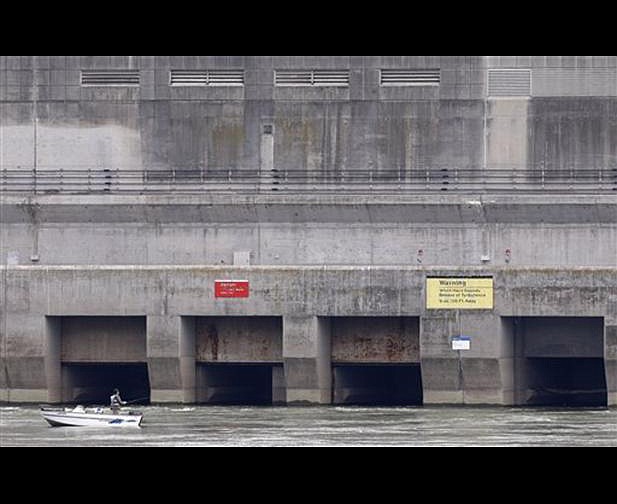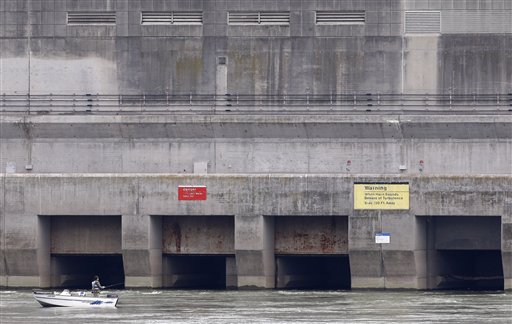Fishermen voice outrage over dam restrictions
Friday, February 22, 2013
NASHVILLE - Anglers in Tennessee and Kentucky are voicing their outrage over a plan by the Army Corps of Engineers to stop them from fishing in the tailwaters of dams on the Cumberland River.
Dams are popular fishing spots because small fish get trapped and attract larger ones like catfish and bass that make for a good catch. But corps officials have been warning that boating too close to the spillways at the dams is a safety risk and that barriers preventing them from getting too close will be going up this year.
Now, fishermen in both states are drumming up support among wildlife groups and elected officials, including congressional members from both states, who have been meeting with corps officials and asking them to reconsider their plans.
Surrounded by Middle Tennessee fishermen, U.S. Sen. Lamar Alexander stood on the banks of the Cumberland River on Thursday just downstream of the Old Hickory Dam and promised to introduce legislation next week that would ask for an environmental impact study, which would stall the corps' plans for months. The corps said in a statement it wouldn't comment on the legislation.
The fishermen crowded around Alexander to thank him for hearing out their concerns, which they say fell on deaf ears among the operators of the dams.
Harry Donnelly, who lives in Old Hickory, said he moved to be closer to the dam where he fishes regularly in the mornings before going to work. In the winter, he mostly catches white bass and crappie and in the summer, he can pull large stripers, sometimes 20 to 50 pounds, or big flathead catfish.
"This is true of any body of water, but 90 percent of the fish live in 10 percent of the water," he noted.
As the small bait fish migrate up the Cumberland, they hit the dam and form a concentrated pool that attracts much larger fish to feed, he explained. That's what brings the fishermen.
Donnelly said he sometimes fishes on a jet ski, because he knows the rushing water spilling out of the dam won't sink it like smaller boats. He knows there are risks involved with fishing near dams, but he said experienced boaters know to look for the warning signs when water is released.
Huge, bright red and yellow signs are posted around the dam requiring fishermen on shore and in boats to wear their life jackets and warning them of violent turbulence and sudden rising water. Lights and sirens come on before they release water, Donnelly said.
"When you hear that siren go off and see that light go on, it's time to move away," he said. "You wait for it to do its thing and then you go back to your spot."
But the corps said 14 people have died in the tailwaters below the dams on the Cumberland River since 1970, including three fatalities since 2009, and several more people have been rescued or nearly drowned.
Corps officials have held public meetings in both states and said they are just following a 1996 policy that would allow them to put up buoys and other restrictions on 10 dams in Kentucky and Tennessee sometime around April.
But Merve Johnson, of Goodlettsville, said the risk is not worth cutting off a popular recreational activity all over the region and the corps officials haven't been willing to consider other options.
"There was no discussion," he said. "It was always a statement: 'This is what we're going to do because this policy was implemented back in 1996."'
These fishermen now have the backing of wildlife agencies, outdoor sports groups, county and state officials and even top lawmakers in Congress. Senate Republican leader Mitch McConnell sent a letter to the Army's assistant secretary for civil works last week that said these restrictions would hurt tourism in Kentucky and questioned whether it was fiscally responsible to spend nearly $3 million on these barriers.
"If we don't get legislation to stop them, they will go ahead and ram it through," said Johnson. "This is totally unnecessary."
Alexander said if the stalling legislation doesn't work, he'll go after the corps' funding, although he noted that Congress is in a stalemate over looming automatic government budget cuts.
"I think it's unreasonable, unnecessary and a waste of money to go forward with this plan," he said.

